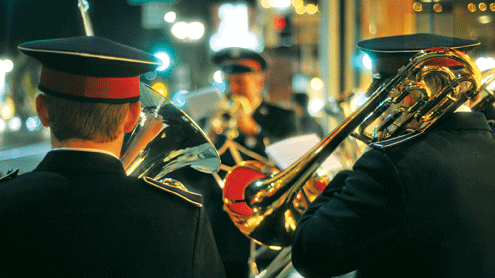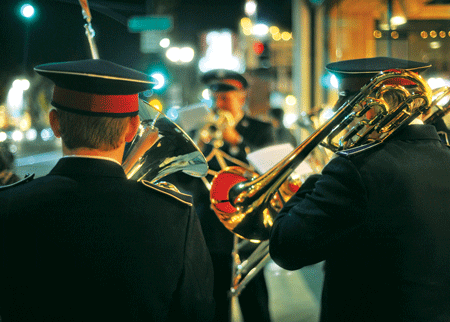Impacting society on the true meaning of the holiday season
By Phil Cooke
Has contemporary culture become illiterate about the real purpose of the Christmas holiday?
When my daughters were in public high school, they were constantly amazed at how few students knew what Christmas was actually about, or had any idea about the real meaning of the nativity.
Across the country, much of the Christmas spirit has become routine, and in most communities, Americans have settled for mere “holiday” celebrations, focusing more on the commercial side of the season. They are no longer connecting Christmas with the birth of Jesus Christ, who brought the world the greatest gift imaginable—a gift of grace, redemption and freedom.
What can be done about this?
While some call it a “culture war” or a “war on Christmas,” I think it’s more of a case of cultural amnesia. The population of this country is simply forgetting why we celebrate Christmas in the first place, and it’s up to us to keep that memory alive.
As Christians, do we celebrate only with our family and other believers, or do we share the joy with those outside our immediate circle?
During the Christmas season—more than at any other time—The Salvation Army intersects with the culture around it in a noticeable way. Through the Red Kettle Campaign, local outreaches, caroling, nativity scenes, national media coverage, special youth events and more, Salvationists have a great opportunity to express their faith to neighbors and friends.
That’s why even if the true reason for Christmas has taken a beating, it’s far from gone, and this year, we have the opportunity once again to remind the world what Christmas is all about. Following are some important tips.
As a Salvationist and a private citizen, don’t be afraid to express your faith in the community or public square. Because of court rulings upholding the separation of church and state, too many Christians shy away from anything remotely religious at Christmas time, especially in public.
For instance, over the last few years in Santa Monica, Calif., atheists have protested the long-standing tradition of featuring nativity scenes in a city park. In other communities, crosses, Christian music and other religious expressions have come under assault. But while the news headlines focus on church and state issues, don’t forget that on a personal level, you have every right to express your faith. So when you decorate your yard, go caroling, or send out cards, use those times as an opportunity to show people the real story of the season. If you have questions about staging a major event on public property, a Christian attorney, the American Center for Law and Justice (aclj.org) or territorial leadership are all good sources of information.
Be gracious about your witness. Too many well-intentioned Christians become bullies when it comes to expressing their faith. Don’t argue with people. Instead, begin developing a relationship of compassion and trust. Growing up in the 1950s and 60s in the South, I didn’t know anyone of another faith. But today I don’t have to go far to meet people with a multitude of different religious beliefs. While some complain about the growing religious diversity of our country, we should actually look at it as an opportunity. After all, the mission field is now coming to us! But if I’m going to be an effective witness in today’s multi-faith community, I have to begin with a gracious relationship and act out of genuine love.
If you’re working in a secular job or at school, be confident but courteous about expressing your faith. The fine legal line about expressions of religious belief at secular workplaces and at public schools is often difficult to navigate, but in many cases, people who crossed the line, did it without asking for advice or counsel. Talk to the school principal or choir director first, and ask about the policy on singing Christmas carols at the school play. Or ask your boss if you can set a nativity scene or other religious object on your desk. I’ve discovered that when we approach people in a spirit of love, God often works in those situations for our good. And even if your request is rejected, how you handle that rejection can sometimes be a greater witness than what you hoped to accomplish in the first place.
By the way, that idea works throughout the year, not just at Christmas. A few years ago when our daughters were still in high school, I noticed that a local sign company had placed a billboard for a sexually provocative TV program on the bus stop across the street from the school. Since hundreds of local school kids used city buses, I was outraged that an advertisement promoting a TV show that made prostitution look glamorous was featured at that location. I called the sign company, but on the phone, I wasn’t upset or mad, I was nice. When I explained how inappropriate the billboard was, the woman quickly apologized and said that the billboard would be switched as soon as possible. Sure enough, within an hour, the advertisement was gone. It was a great reminder that simply being gracious can make a significant difference.
This season, be more creative. Remember that in the very first chapter of Genesis, God describes himself as a creator. But although we’re made in his image, we often don’t value the importance of creativity as much as we should. In today’s cluttered and distracted world, it’s the truly original messages that stand out and get noticed. If you put up the same decorations, conduct the same program, or the follow the same traditions year after year, maybe it’s time to approach Christmas in a new way. The message never changes, but how we share it should be new and innovative. Maybe your community is turning you off because they’re tired of the same old thing. Perhaps thinking differently will capture their attention—and eventually their hearts.
If you’re stumped for a more creative way to impact your community this Christmas, think about this: How about moving the celebration out of your church or outreach center, and into the neighborhood? Remember all the people who (for various reasons) simply won’t visit a local church or other ministry facility. Take the Christmas season to them. Hold a block party, invite neighbors into your home, or celebrate at a local restaurant. Learn to speak the language of the culture, and if they’re uncomfortable about coming to you, reach out to them.
Remember that the season is about sharing. We have the opportunity to share the most important story in the world: about a God who cared so much that he chose to enter our world and become one of us. Don’t miss any chance this year to share that story with family, friends and other loved ones. And if you find sharing the gospel awkward or uncomfortable, the creative thinkers in the Western Territory have created SAVN.TV, a video-driven website focused on short films and videos that tell stories about The Salvation Army’s work around the world. Whenever the moment seems right, share one of the short films with a friend. After all, who doesn’t love a good movie? And then use that story to share the greatest gift of all, the gift that this Army is named after: Salvation. As the SAVN tagline says: “It’s your world—do something!”
Finally, it’s not Santa’s fault. Too many Christians blame Santa for distracting people from the story of the incarnation. Obviously Santa Claus isn’t the reason for the season, but don’t rob your children of the joy of giving and experiencing the wonder and excitement of the big guy in the red suit. Plus, giving gifts is a fantastic common ground to begin a discussion with a non-Christian about God’s ultimate gift. Let’s lighten up and enjoy the North Pole, the reindeer, and the anticipation of the sound of hooves on the roof at midnight. But never forget to teach your children and grandchildren the story of how God gave us the greatest gift of all.
Phil Cooke, Ph.D., is a filmmaker and media consultant to ministries and churches worldwide. He’s the author of “One Big Thing: Discovering What You Were Born to Do.”
Find out more at www.philcooke.com.













